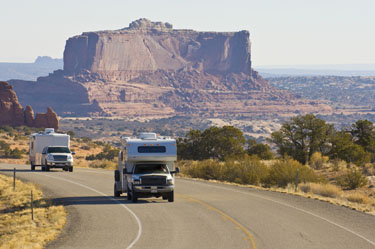Butane – The Perfect Fuel for Camping and Caravanning
During the summer months, we begin to emerge from long periods of hibernation inside our homes to relish in the beautiful weather, enjoying sunny days and warm nights. Especially if you live in colder regions of the United States, you probably have the urge to do a little outdoor cooking when the temperature finally starts to rise. Whether you’re entertaining friends in your backyard or communing with nature during a long backpacking trek, be sure to stock up on canisters and tanks of butane that will help you to cook your outdoor feast to perfection. With many options on the market for heating your outdoor cooking, it can be difficult for consumers to know which fuel to turn to. Here are a few reasons to consider butane as your camping and caravanning fuel of choice.
Why is Butane Ideal for Camping and Caravanning?
When camping in tents or cars, or going on an extended journey with a motorhome, most travellers require a portable fuel source for heating and/or cooking. While caravans, motorhomes, and trailers usually come with a gas installation with special storage space for a canister or tank, campers who carry all of their belongings on their back will need to invest in a portable stove that has gas bottle fixtures. Here are a few advantages of using butane gas while on the trail.
- Butane is Inexpensive
- Butane Works Quickly
- Butane is Easy to Use
- Butane is Less Toxic and Better for the Environment
- Butane is Easy to Carry
- Butane is Energy Efficient
Butane is derived from the process of refining natural gas or crude oil, and due to recent advances in drilling technology that can fracture shale deposits, natural gas and its derivatives are more available than ever before. Although butane and propane are extracted via the same process, butane is less expensive than its hydrocarbon peer and bottles of butane often contain higher volumes.
When lighting a portable gas cartridge stove, butane lights instantly and reaches its maximum heat output right away so that you don’t have to wait to start cooking. One liter of water only takes about three to six minutes to boil when using a gas stove. Gas camping stoves are also very easy to control, long lasting, maintenance free, and safe. Butane canisters are easily resealed even when they’re not completely empty and can be saved and used for the next meal.
Compared with using other types of fuel such as unleaded gasoline and kerosene, butane is extremely easy to use. While other types of fuel may require priming with a preheat fuel or pouring a certain amount out, butane cartridges and canisters are easily attached to the stove and then they’re ready to go. Pressure-regulated stoves allow steady output throughout the bottle’s life, even when it’s approaching empty. With a number of butane producers such as Whip-It! butane and Puretane, butane is also widely available, especially online.
As with all gases, both butane and propane carry some health risks if they are inhaled directly. But out of butane and propane, butane is less toxic and can be legally bought and stored indoors. It burns cleaner than propane and other fuels as it normally only produces carbon dioxide, not the more deadly carbon monoxide.
When you’re carrying all of your belongings on your back throughout the day, every ounce of weight matters. Butane bottles are much lighter than those filled with propane, and because they are energy efficient, you don’t have to bring as many bottles of butane with you in the first place. If you’ve got days’ or even weeks’ worth of camping gear in your pack, butane is the clear choice for easier transportation and disposal.
Although natural gases in general are not considered as environmentally friendly as other alternate energy sources, as of right now they are cheaper, more powerful, and more widely available than any of the green alternatives. That being said, it’s still important to use less for more when it comes to natural gases and their derivatives. Butane produces about 12% more energy than propane when the same volumes are burned above freezing. Campers will save on both money and space by using butane because they won’t need to buy or pack as many butane refills as propane refills.
There’s only one disadvantage to butane, but it’s important to recognize before you get stuck with it! If you’re going camping in the winter, it’s best not to bring butane. Once temperatures dip below freezing, it’s difficult or even impossible for the liquid inside of butane bottles to turn into a gas, meaning that it won’t produce any flame. So, if you’re planning on encountering subzero temperatures, it’s best to go with propane.

